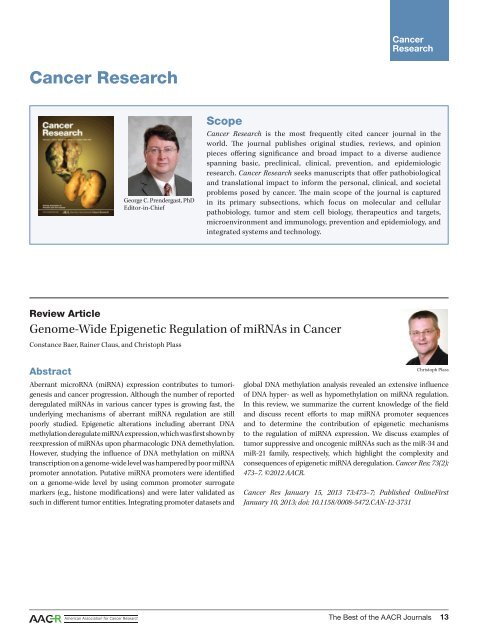Best of AACR Journals
Create successful ePaper yourself
Turn your PDF publications into a flip-book with our unique Google optimized e-Paper software.
Cancer<br />
Research<br />
Cancer Research<br />
George C. C. Prendergast, PhD<br />
Editor-in-Chief<br />
Scope<br />
Cancer Research is the most frequently cited cancer journal in the<br />
world. The journal publishes original studies, reviews, and opinion<br />
pieces <strong>of</strong>fering significance and broad impact to a diverse audience<br />
spanning basic, preclinical, clinical, prevention, and epidemiologic<br />
research. Cancer Research seeks manuscripts that <strong>of</strong>fer pathobiological<br />
and translational impact to inform the personal, clinical, and societal<br />
problems posed by cancer. The main scope <strong>of</strong> the journal is captured<br />
in its primary subsections, which focus on molecular and cellular<br />
pathobiology, tumor and stem cell biology, therapeutics and targets,<br />
microenvironment and immunology, prevention and epidemiology, and<br />
integrated systems and technology.<br />
Review Article<br />
Genome-Wide Epigenetic Regulation <strong>of</strong> miRNAs in Cancer<br />
Constance Baer, Rainer Claus, and Christoph Plass<br />
Abstract<br />
Aberrant microRNA (miRNA) expression contributes to tumorigenesis<br />
and cancer progression. Although the number <strong>of</strong> reported<br />
deregulated miRNAs in various cancer types is growing fast, the<br />
underlying mechanisms <strong>of</strong> aberrant miRNA regulation are still<br />
poorly studied. Epigenetic alterations including aberrant DNA<br />
methylation deregulate miRNA expression, which was first shown by<br />
reexpression <strong>of</strong> miRNAs upon pharmacologic DNA demethylation.<br />
However, studying the influence <strong>of</strong> DNA methylation on miRNA<br />
transcription on a genome-wide level was hampered by poor miRNA<br />
promoter annotation. Putative miRNA promoters were identified<br />
on a genome-wide level by using common promoter surrogate<br />
markers (e.g., histone modifications) and were later validated as<br />
such in different tumor entities. Integrating promoter datasets and<br />
Christoph Plass<br />
global DNA methylation analysis revealed an extensive influence<br />
<strong>of</strong> DNA hyper- as well as hypomethylation on miRNA regulation.<br />
In this review, we summarize the current knowledge <strong>of</strong> the field<br />
and discuss recent efforts to map miRNA promoter sequences<br />
and to determine the contribution <strong>of</strong> epigenetic mechanisms<br />
to the regulation <strong>of</strong> miRNA expression. We discuss examples <strong>of</strong><br />
tumor suppressive and oncogenic miRNAs such as the miR-34 and<br />
miR-21 family, respectively, which highlight the complexity and<br />
consequences <strong>of</strong> epigenetic miRNA deregulation. Cancer Res; 73(2);<br />
473–7. ©2012 <strong>AACR</strong>.<br />
Cancer Res January 15, 2013 73:473–7; Published OnlineFirst<br />
January 10, 2013; doi: 10.1158/0008-5472.CAN-12-3731<br />
The <strong>Best</strong> <strong>of</strong> the <strong>AACR</strong> <strong>Journals</strong> 13



